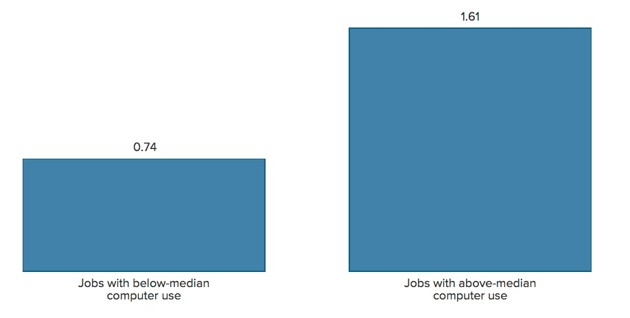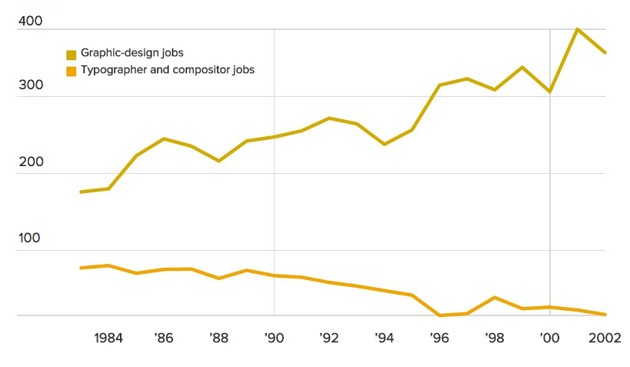Interesting @JamesBessen piece - The Automation Paradox, or why robots often increase the need for people https://t.co/9RbLZet6rO
— Varun Deshpande (@varund7) January 19, 2016The Automation Paradox
When computers start doing the work of people, the need for people often increases.
automation as a cause of the slow recovery from the Great Recession and the “hollowing out of the middle class.” Others see white-collar automation as causing a level of persistent technological unemployment that demands policies that would redistribute wealth.Robot panic is in full swing.
.......... It turns out that workers will have greater employment opportunities if their occupation undergoes some degree of computer automation. As long as they can learn to use the new tools, automation will be their friend. ......... While electronic discovery software has become a billion-dollar business since the late 1990s, jobs for paralegals and legal-support workers actually grew faster than the labor force as a whole, adding over 50,000 jobs since 2000, according to data from the U.S. Census Bureau. The number of lawyers increased by a quarter of a million. ....... Something similar happened when ATMs automated the tasks of bank tellers and when barcode scanners automated the work of cashiers: Rather than contributing to unemployment, the number of workers in these occupations grew. ...... Automation reduces the cost of a product or service, and lower prices tend to attract more customers. Software made it cheaper and faster to trawl through legal documents, so law firms searched more documents and judges allowed more and more-expansive discovery requests. Likewise, ATMs made it cheaper to operate bank branches, so banks dramatically increased their number of offices. So when demand increases enough in response to lower prices, employment goes up with automation, not down. And this is what has been happening with computer automation overall during the last three decades. It’s also what happened during the Industrial Revolution when automation in textiles, steel-making, and a whole range of other industries led to a major increase in manufacturing jobs. ....... desktop publishing systems have meant fewer jobs for typographers, as graphic designers took over their work. Computerized phone lines meant fewer jobs for telephone operators, but more jobs for receptionists ...... Workers with computers frequently substitute for workers in non-computerized jobs. ........ Computers create about as many jobs as they eliminate. In other words, automation is not causing persistent unemployment. ....... only about 5 percent of jobs are at risk of being completely automated in the near future. The main effect of automation for the time being will not be to eliminate jobs, but to redefine them—changing the tasks and the skills needed to perform them. ..... bank tellers have become more like marketing specialists, telling customers about bank loans, CDs, and other financial offerings. .....the jobs that get transferred to other occupations tend to be predominantly low-pay, low-skill jobs, so the burdens of automation fall most heavily on those least able and least equipped to deal with it
..... some community colleges are collaborating with local employers to create work-study programs that allow trainees to learn on the job as well as in the classroom ..... These are the kinds of policies that can help overcome the real burden of automation. They deserve more attention than any panic about a supposed robot apocalypse.


